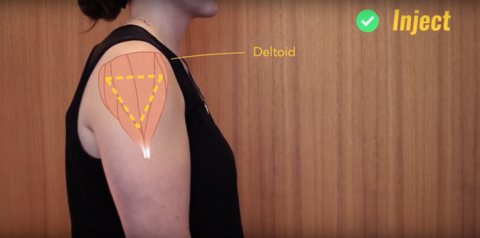
How to help protect yourself from vaccine administration injury
A study by professors Sherilyn Houle and Kelly Grindrod and pharmacy student Ashley Bancsi reiterates the need for health care professionals, including pharmacists, to take certain precautions to minimize the risk of their patients suffering shoulder injury related to vaccine administration (SIRVA).
SIRVA is an uncommon and understudied phenomenon that people may experience after receiving an improperly administered vaccination. It occurs when an injection is administered too high in the arm, and the vaccine is delivered to the shoulder capsule instead of the deltoid muscle.
With flu season underway and flu vaccinations widely available, both the public and health care providers should understand how to recognize and respond to SIRVA. There are strategies we can adopt to decrease the likelihood of experiencing SIRVA.
“When going for your flu shot, wear a sleeveless shirt or a shirt where the sleeves can easily be rolled up. Don’t pull the neck of your shirt down as this can lead to a vaccine being injected into the shoulder instead of the arm. Putting your hand on your hip with your elbow out and away from the body will also help relax the deltoid muscle where the injection is going.”
It is common to experience a dull muscle ache after a vaccine injection, but that pain disappears within a few days. By contrast, SIRVA will result in pain that begins within 48 hours of vaccine administration and does not improve with over-the-counter painkiller medications
“In patients who experience SIRVA, months may pass by, and patients will still complain of increasing pain, weakness, and impaired mobility in the injected arm. Simple actions like lifting your arm to brush your teeth can cause pain,” said Grindrod. “It’s important that we learn to recognize these signs of SIRVA so that we can access appropriate treatment.”
People experiencing these symptoms should talk to their doctor. An ultrasound scan is necessary to diagnose SIRVA and determine the level and type of damage. Treatment includes a corticosteroid injection to the shoulder or physiotherapy.
Though SIRVA is fairly uncommon, it also often goes undiagnosed. Improved awareness about SIRVA is necessary for health care providers as well as patients. Grindrod and co-authors conducted a review of the literature to develop resources that teach health care providers about SIRVA and how to avoid it by using proper vaccination landmarking techniques.
The article, Getting it in the right spot: Shoulder injury related to vaccine administration (SIRVA) and other injection site events, recently appeared in the Canadian Pharmacists Journal.